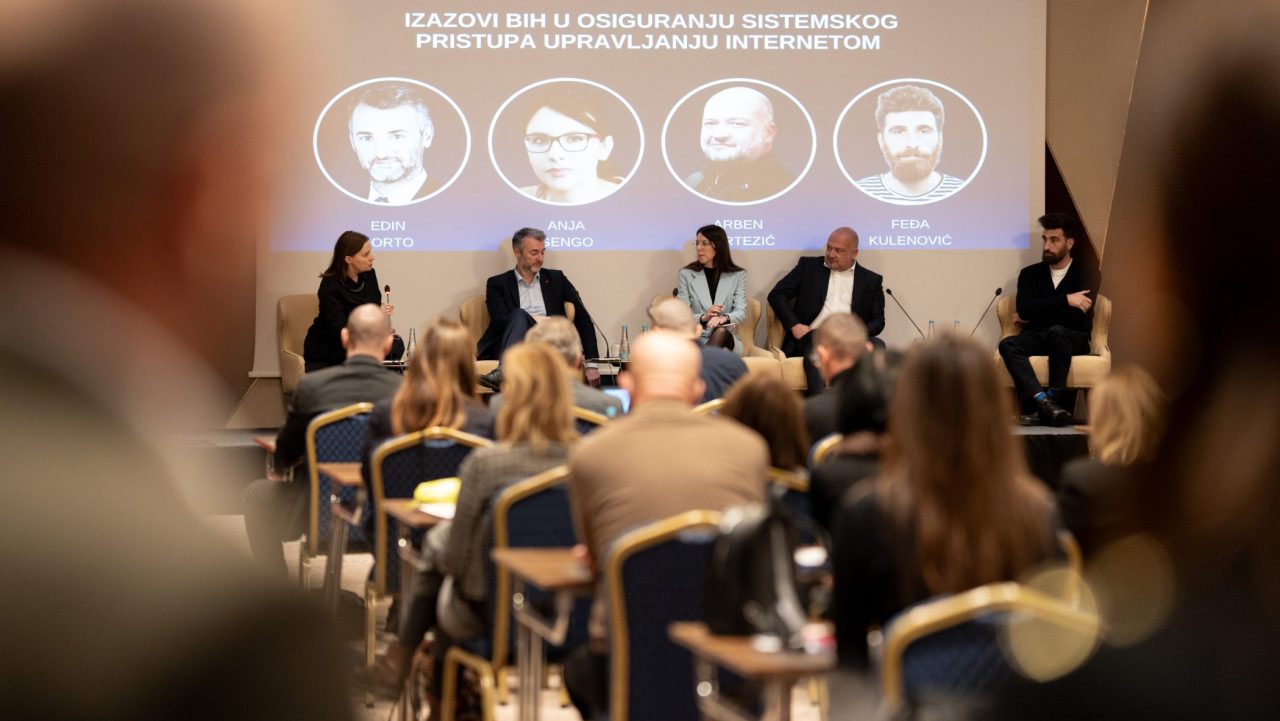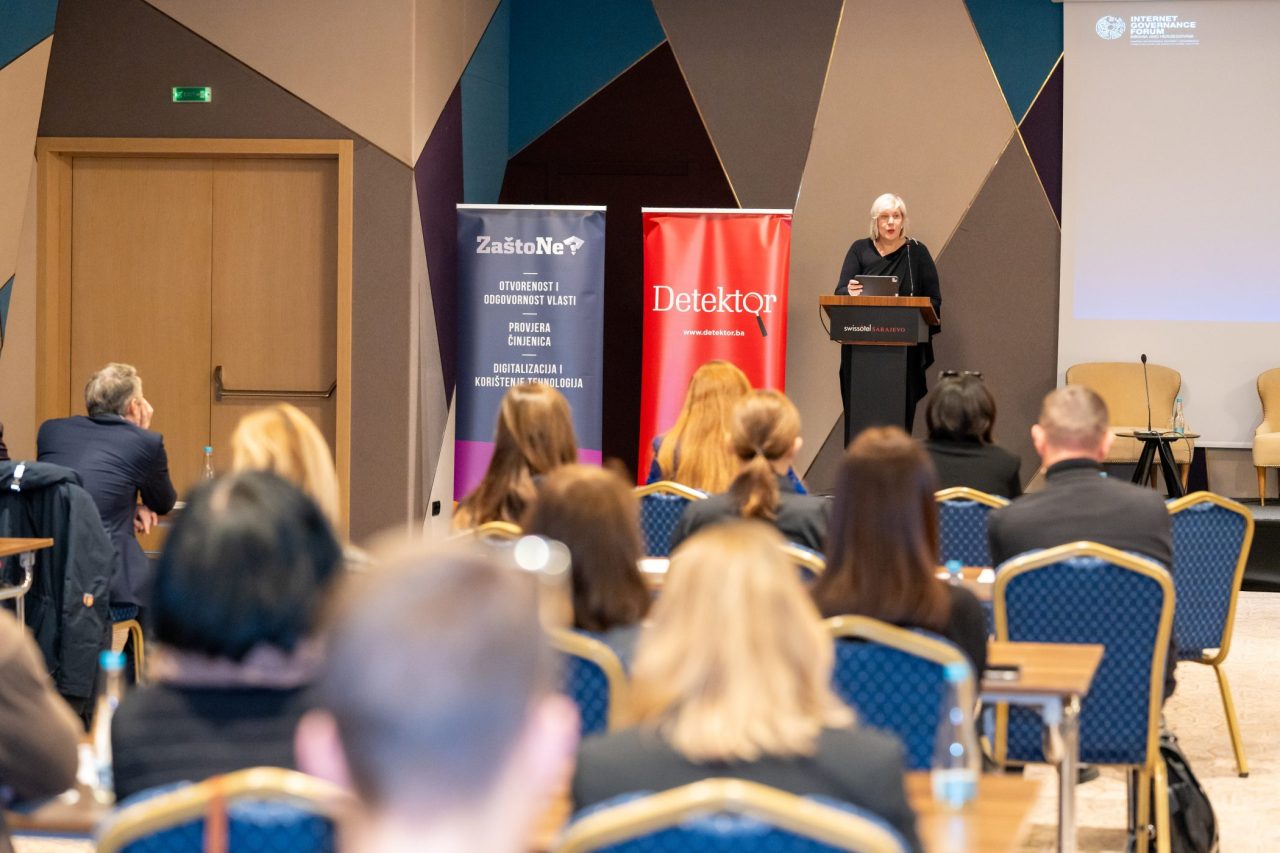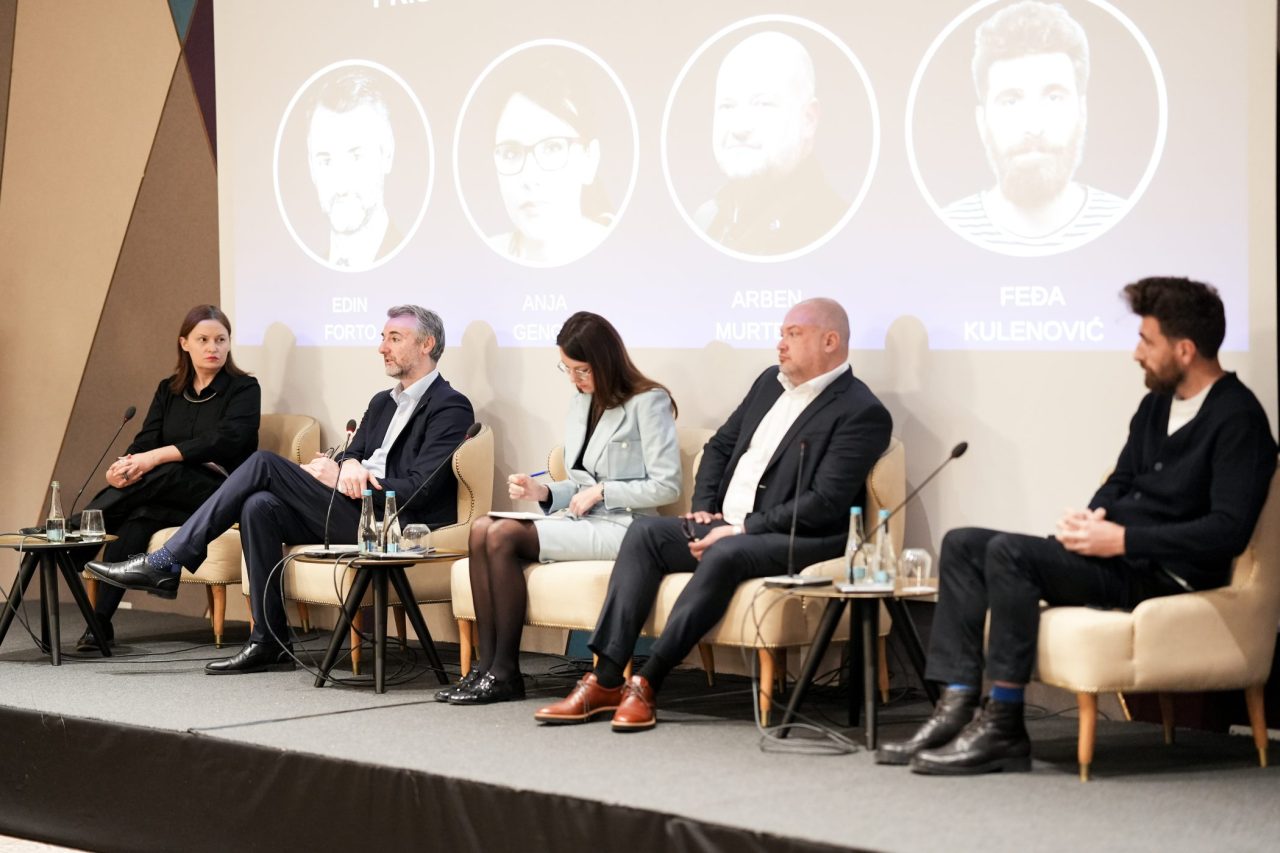This post is also available in: Bosnian
 Forum za upravljanje internetom. Foto: Detektor
Forum za upravljanje internetom. Foto: Detektor
Denis Dzidic, Executive Director of the Balkan Investigative Reporting Network of Bosnia and Herzegovina (BiH), which organized the Forum, noted the frequent antagonism between the non-governmental sector and authorities in implementing reforms as well as the absence of inclusive and solution-oriented dialogue.
“We have noticed that all the topics we cover – disinformation, transitional justice, malign influence, and many other issues currently facing BiH, including a series of challenges with European integration and digitalization – are issues that should be addressed more broadly through the concept of Internet governance. In this approach, we very rarely see the participation of the entire community,” he said.
Darko Brkan, Executive Director of the citizens’ association ‘Why Not?’, highlighted the growing importance of issues related to internet governance, stressing that BiH must be integrated into global processes and avoid lagging behind on European Union initiatives concerning the information space and digital services.
Ingrid MacDonald, United Nations Resident Coordinator in BiH, pointed out that everyone is vulnerable to the dangers of online disinformation, which, particularly when combined with hate speech, can stigmatize and dehumanize communities.
“Protecting children is especially important in the context of BiH, to ensure that there are security mechanisms in place in the online sphere to prevent sexual predators and others who target children through recordings or other means of sexual exploitation. It is important to have safeguards in place, because the internet can be a very scary space, and once information becomes public, it remains available forever,” she said.
 Forum za upravljanje internetom. Foto: Detektor
Forum za upravljanje internetom. Foto: Detektor
Speaking about cyber-security and artificial intelligence, Dunja Mijatovic, a human rights and new technologies expert, stressed that these are global phenomena that impact everyone, transcending national and ethnic divisions as well as the complexity of BiH’s state structure. She emphasized that the Forum has helped speed up processes in many countries, but BiH remains the only country in the region lacking a national strategy on digital security and has fallen behind in many other areas of internet governance.
“It’s important to note that it’s not all bad. Although we are lagging behind in certain areas, there are people who want to enact change, but this is impossible without government participation,” she said.
Mijatovic continued, “In the context of internet governance, the media has three key roles: fostering accountability, promoting media literacy, and connecting local and global perspectives. My message today is that it is necessary to involve the media as relevant actors.”
During a panel discussion on the challenges facing BiH in ensuring a systemic approach to internet governance, Edin Forto, Minister of Communications and Transport of BiH, emphasized the lack of consensus on how to manage cyber-security in the country.
“The state is already vulnerable to attacks. Last year, we had an attack on the BiH Parliament. All data would have been destroyed, but one of the servers was broken and offline, so the data was saved. It sounds unbelievable, but we accidentally saved the data through this negligence. There is no protocol, no one knows who to call or who to turn to, there is no legal framework,” he said.
Jillian C. York, Director of the International Freedom of Expression at the Electronic Frontier Foundation, discussed how major platforms approach content moderation in small countries like BiH, noting they often put profits before people.
“They usually do not invest the necessary resources in understanding the local language, dialects, cultural context, and the needs of the population. This leads to inconsistent moderation worldwide, especially in places where investment is lacking. Studies, including those being presented today, demonstrate that local needs and historical contexts have not been taken into account. Algorithmic practices often designed for other parts of the world and different languages have a disproportionate impact on local circumstances,” she said.
 Forum za upravljanje internetom. Foto: Detektor
Forum za upravljanje internetom. Foto: Detektor
Maja Calovic from the Coalition for Content Moderation stated that due to its market size, BiH may not be on the radar of many major platforms, necessitating the empowerment of the civil sector and other actors involved in these processes. Regarding tools for reporting inappropriate content, which are available to everyone, Calovic explained that platforms themselves have mechanisms for content reporting, with guidelines reflecting the laws, business practices, and cultural attitudes of the company’s country of origin.
Lamija Silajdzic, a professor at the Political Science Faculty of Sarajevo University, said that the risk posed by disinformation in BiH is indeed significant, with the potential to deepen existing societal divisions.
“As for the status of the media in all of this, unfortunately, they are increasingly losing public trust because they are seen as tools of political structures,” she said. She partly attributed this erosion of trust to the poor financial state of traditional media, which has resulted in very little investment in training journalists to combat disinformation.
Denis Dzidic noted that recommendations from BiH would be submitted and presented at the next World Internet Governance Forum, scheduled to take place in Riyadh, Saudi Arabia, in December.
The Organizing Committee of the fifth Forum includes the Balkan Investigative Reporting Network of BiH, the citizens’ association ‘Why Not?’, the Center for Education of Judges and Prosecutors of the Federation of BiH, the Coalition for Content Moderation in BiH, and the Faculty of Political Sciences in Sarajevo. The Forum is supported by the Internet Society Foundation (ISOC), the U.S. Embassy in BiH, the Internet Governance Forum Support Association, the Hanns Seidel Stiftung in Sarajevo, and the Swedish International Development Cooperation Agency (SIDA).

